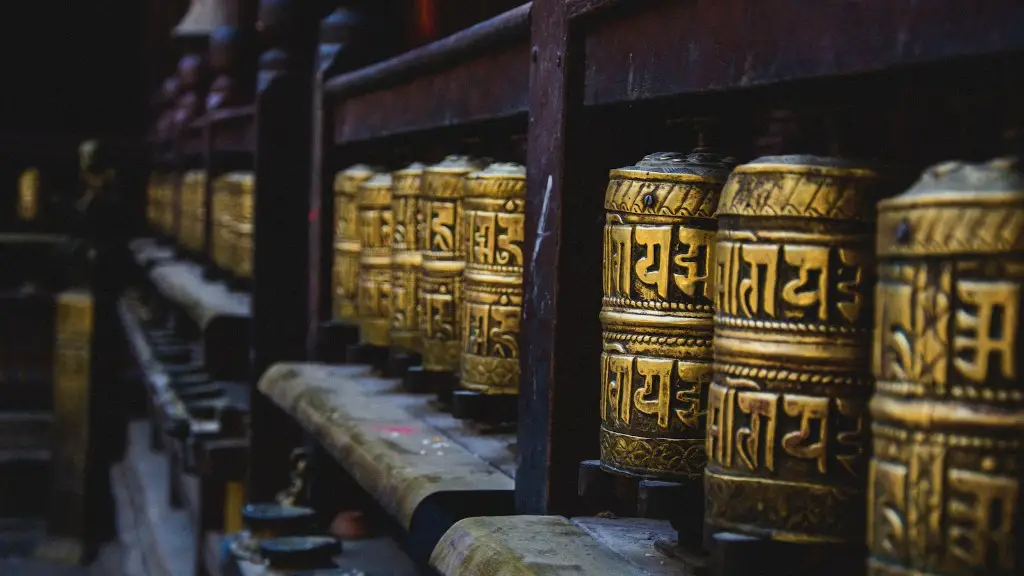Buddhism and Hinduism are two ancient religions with many similarities, including the belief in reincarnation. Reincarnation means one’s soul is reborn in another body following death. It is a central tenet of both religions, and is closely tied to the belief that karma influences a person’s future life. It is believed one’s destiny is shaped by their actions in the present and past life, and that reincarnation will continue until the soul has attained nirvana or liberation.
The Hindu concept of reincarnation is known as samsara; a cycle of death and rebirth in which the soul transmigrates to a different body. Hindus believe that the word samsara carries with it the effects of one’s deeds in previous lifetimes, and dictates the current form of one’s physical body. According to Hinduism, it is only after a soul has escaped this cycle of rebirths that it can be liberated and achieve moksha, or spiritual salvation.
Buddhism shares the idea of samsara, but does not view it in quite the same light. The core teaching of the Buddha is about transcending the cycle of repeated birth and death, to break the cycle and move beyond suffering. According to Buddhist tradition, one can break the cycle by following the Noble Eightfold Path. Buddhism also emphasises the concept of developing good karma through a combination of wholesome thoughts and deeds, and that the accumulation of good karma will determine one’s next life.
In both Buddhism and Hinduism, reincarnation is not seen as a punishment or reward, but as an opportunity to learn and develop spiritually. While Hindus tend to view reincarnation as an unavoidable part of existence, Buddhists take a more proactive stance and focus on working towards obtaining liberation from the cycle of rebirth.
Experts indicate that Hindus and Buddhists do not always agree about the nature of the soul and what happens during the cycle of rebirths. For example, although Hindus believe in an unchanging, eternal soul, Buddhists believe that the soul is constantly changing and evolving in each life. Likewise, while Hindus believe that one’s soul is tied to one’s descendants, Buddhists believe that a soul may take on a completely different body and lineage in each life.
The belief in reincarnation is a complex one; however, both Buddhism and Hinduism agree that it is part of the cycle of life and that it can be used to one’s advantage. Whether one seeks comfort in the idea of a life after death, or uses it as an opportunity to gradually progress towards enlightenment, the belief in reincarnation remains a powerful and unifying concept for many Hindus and Buddhists around the world.
Effects Of Good/Bad Karma On Reincarnation
Both Buddhism and Hinduism believe that one’s current and future life are affected by the karma,or deeds, from a previous life. Hinduism teaches that good deeds bring good consequences and bad deeds bring bad consequences. This concept is known as the “law of karma.” According to this belief, one’s actions, thoughts, and words all contribute to the accumulation of karma and, ultimately, one’s destiny.
In Buddhism, the Karma is seen as a system of cause and effect. According to Buddhist tradition, one’s actions and intentions directly determine the unfolding of one’s destiny. The concept of karma is closely linked to the idea of reincarnation, with the understanding that the effects of one’s karma will determine one’s next life.
Hinduism and Buddhism also agree that it is possible to break the cycle of rebirths and attain salvation or liberation from the cycle of death and rebirth. According to Hinduism, this can be achieved through the understanding and worship of a divine being, and the accumulation of good karma. In Buddhism, the same is believed, but it also emphasises avoidance of all negative influences, including greed, and following the Noble Eightfold Path.
Buddhism Vs Hinduism: Reincarnation Beliefs
Although Buddhism and Hinduism have similar beliefs concerning reincarnation, they have some important distinctions. For example, in Hinduism, the soul is eternal and unchanging, while Buddhists believe that the soul is constantly changing and evolving, and that life is a never-ending cycle of death and rebirth.
Buddhism also emphasises the concept of karma more than Hinduism does, and believes that the actions of one’s past life will determine the form of one’s next existence. Hindus, on the other hand, believe that one’s conditions in this life are determined more by one’s shared genetic inheritance and ancestral environment.
In terms of the ultimate goal, both religions agree that liberation from the cycle of rebirth is possible, but the paths to achieve it are quite different. Hindus believe that liberation from the cycle of rebirths can be achieved through the understanding and worship of one’s chosen God or Goddess, and the accumulation of good karma. Buddhists, however, believe that liberation comes through following the Eightfold Path, which includes studying and understanding your mind, body, and behavior, and making changes in order to reduce suffering.
The Significance Of Reincarnation In Buddhism And Hinduism
The belief in reincarnation is one of the major factors that unify Buddhism and Hinduism. For many believers, the concept of rebirth offers comfort: it implies that life does not end after death, and is instead an ongoing cycle that allows one to learn and grow as a spiritual being.
It also provides an incentive for personal growth, with the understanding that one’s current life is directly influenced by the actions taken in past lives. Both Hinduism and Buddhism encourage followers to lead a morally upright life in order to accumulate good karma and increase one’s chances of being reborn as a higher form.
The belief in reincarnation recognizes that life is a process, and that death is just a part of a much larger cycle. It also provides a way to make sense of the suffering and injustice of the world, while remaining hopeful that the soul will be reborn in a better form in the future.
How Do Buddhists And Hindus Practice Reincarnation?
How a person practices reincarnation depends to a large extent on their individual beliefs and understanding of the concept. Some Hindus may perform certain rituals for the deceased in order to help the soul in its transition; however, this is not a universal practice.
Buddhist practice tends to be more focused on one’s present life, with an emphasis on reducing suffering and improving one’s karma, in anticipation of a better life in one’s next incarnation. Buddhists may meditate or chant in order to understand and improve their inner self or make offerings to the Buddha in order to accumulate good karma.
Ultimately, the practice of reincarnation is highly individual, and may differ even among practitioners within the same tradition. It is important to note that the beliefs and practices associated with reincarnation are not set in stone; they are subject to interpretation and evolution as one’s understanding of the concept changes.
Conclusion: How Does The Belief In Reincarnation Benefit Us?
The belief in reincarnation is an integral part of many religious traditions, including Buddhism and Hinduism. It offers comfort in the face of mortality, and provides an incentive to live a moral and virtuous life. Most importantly, it encourages followers to strive for self-improvement and peace, knowing that each life is an opportunity to learn and grow.
Reincarnation also serves as a reminder that our actions have consequences, and that we as individuals have the power to shape our own destinies. By recognizing the importance of this belief, we can learn to cherish every moment, deepen our understanding of ourselves, and strive towards a more peaceful and harmonious life.

